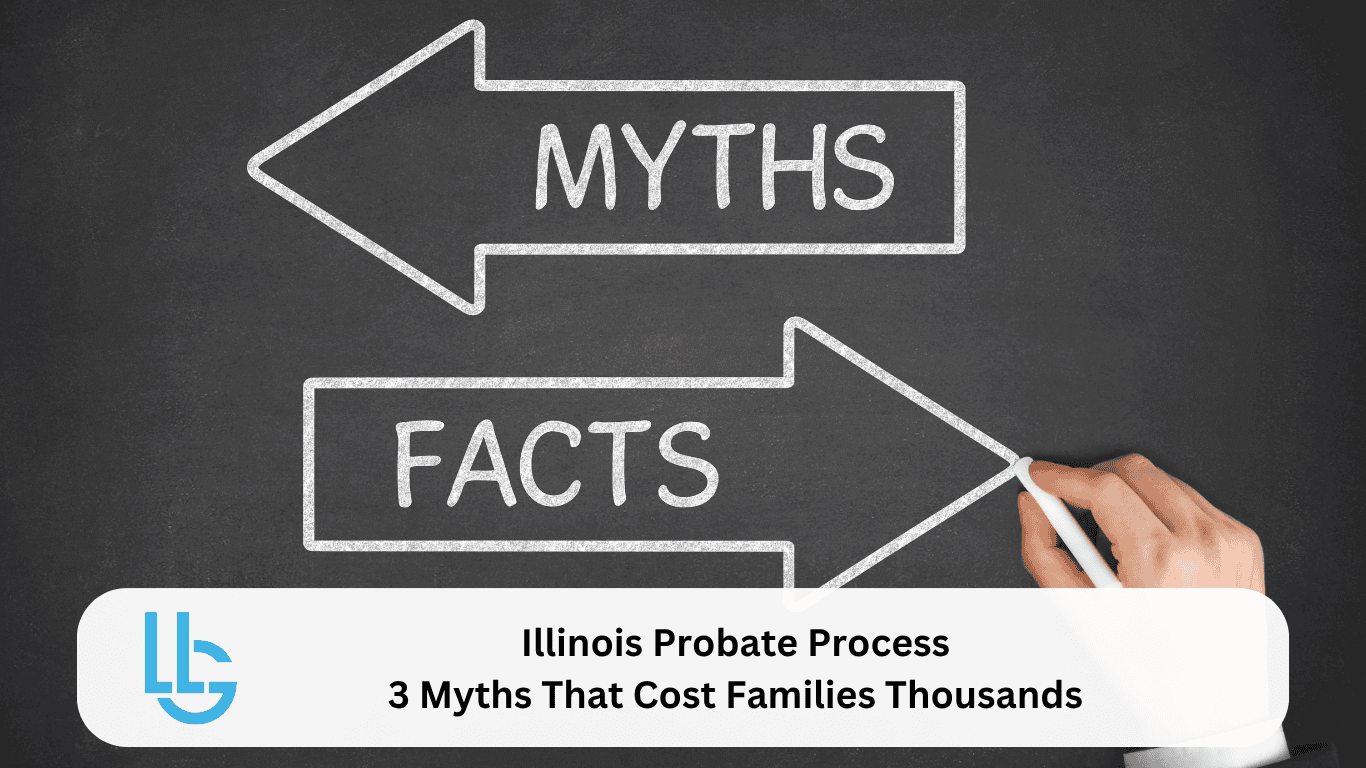Illinois Probate Process: 3 Myths That Cost Families Thousands

Illinois Probate Process: 3 Myths That Cost Families Thousands
Many families in Illinois believe probate is something to fear: expensive, confusing, and drawn out for years. The truth is that the Illinois probate process doesn’t have to be painful if you understand how it really works. Misunderstandings about the process can lead to unnecessary stress, delays, and higher legal fees.
At Long Law Group, our Naperville probate attorneys help families every day navigate the probate process efficiently and with compassion. Below are some of the most common Illinois probate myths we hear and what really happens instead.
Myth #1: “If I have a will, my estate won’t go through probate.”
The reality:
A will does not avoid probate in Illinois. A will simply directs who inherits your property, but the assets still need to go through probate court if they are titled solely in the deceased person’s name.
If you own property or bank accounts in your own name and don’t have joint ownership or a beneficiary listed, your executor must open probate even if you have a valid will.
Example:
Jim, a Naperville resident, passed away leaving a home, a bank account, and a car—all titled only in his name. His will named his daughter, Emily, as his beneficiary. Even though Jim had a valid will, Emily still had to file it with the court and open probate to transfer ownership of his property.
If Jim had used a revocable living trust or added transfer-on-death (TOD) designations to his accounts and a transfer-on-death instrument (TODI) for his home, Emily could have avoided probate in Illinois completely.
Myth #2: “Probate always takes years and costs a fortune.”
The reality:
While complicated estates can take longer, most uncontested Illinois probate cases are completed within nine to twelve months. The Illinois probate process itself is not designed to be slow. The real cause of delays and high costs usually comes from missing documents, unclear estate plans, or family disputes.
Example:
Lisa’s mother passed away with a simple will, two bank accounts, and a condo in Wheaton. Because her mother’s estate plan was clear and complete, Lisa’s probate attorney helped her finish the process in about eight months.
Tom’s family, however, tried to handle probate without an attorney. They tried filing the documents themselves, waited to get a hearing date, and when they finally appeared, the Judge told them they had to hire an attorney, and the case was delayed by more than four months.
Working with an experienced DuPage County probate attorney helps families avoid costly mistakes that cause unnecessary delays in the probate process.
Myth #3: “Probate is only for the wealthy.”
The reality:
The Illinois probate process has nothing to do with wealth. It depends on how assets are titled. Even modest estates can require probate if assets are held in one person’s name without beneficiary designations.
In Illinois, a Small Estate Affidavit can sometimes be used if the total value of the estate is under $100,000 (increasing to $150,000 in August 2025) and there is no real estate involved. Anything above that limit generally requires a formal probate case.
Example:
Maria assumed her father’s $120,000 estate wouldn’t need probate because the amount seemed small. But his accounts were titled only in his name, and his house was solely owned. She had to open probate in Cook County to access the funds and transfer ownership of the home.
How to Avoid Probate in Illinois—or Make It Easier
With proper estate planning, the Illinois probate process can often be simplified or avoided altogether. Some common strategies include:
- Creating a revocable living trust – Keeps assets out of probate entirely
- Using transfer-on-death (TOD) or payable-on-death (POD) designations – Allows accounts to pass directly to beneficiaries
- Naming beneficiaries on accounts and life insurance – Bypasses probate court
- Adding joint ownership where appropriate – Ensures automatic transfer to surviving owner
- Keeping clear records of assets and estate documents – Streamlines the process if probate is necessary
A well-structured estate plan prevents confusion, protects your loved ones, and minimizes the need for court involvement.
Why Work With a Naperville Probate Attorney
At Long Law Group, we focus on estate planning, probate, and guardianship law in Illinois. Our Naperville probate attorneys handle everything from straightforward estates to complex trust administration, guiding families throughout DuPage County, Cook County, Will County, Kane County, and the greater Chicago area.
We believe the Illinois probate process should be a clear, compassionate experience that helps families move forward—not a burden.
Takeaway
Understanding the truth about the Illinois probate process can save your family time, stress, and money. The best time to plan is before a crisis happens.
Contact Long Law Group today at 312-344-3644 or contact@JLongLaw.com to speak with a Naperville probate attorney about simplifying your estate plan, learning how to avoid probate in Illinois, and protecting your family’s future.
Additional Articles about Estate Planning and Administration in Illinois

Informational/Promotional Content: The content of this website is informational and/or promotional and not for the purpose of providing legal advice. To obtain legal advice, please contact Long Law Group or your attorney with respect to any particular issue or problem. No Attorney-Client Relationship Created by Use of this Website: Neither your receipt of information from this website nor your use of this website to contact Long Law Group creates an attorney-client relationship between you and Long Law Group or any of its employees. As a matter of policy, Long Law Group does not accept a new client without first investigating for possible conflicts of interest and obtaining a signed engagement letter. Accordingly, you should not use this website to provide confidential information about a legal matter of yours.